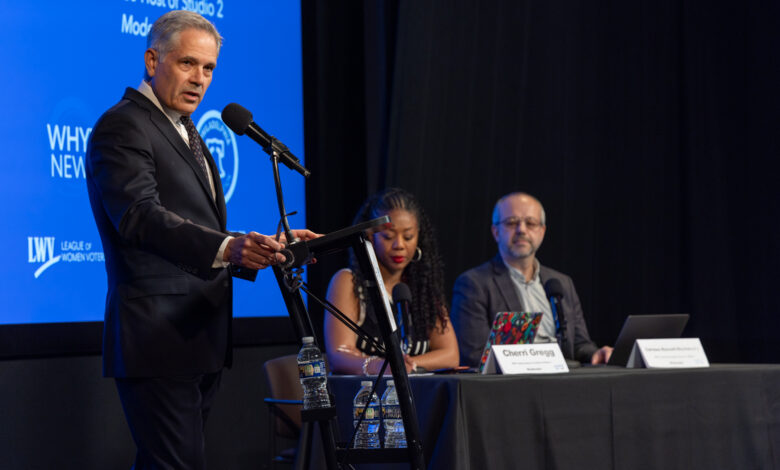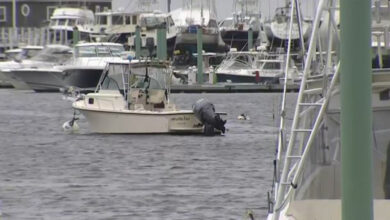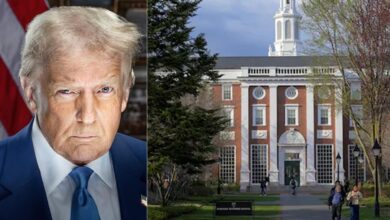As for organized, professional thieves, “they’re just not going to get mercy,” he said.
Russell-Sluchansky asked about the perception that Krasner’s vigorous prosecution of police misconduct has harmed collaboration with police and City Hall and made it harder for the Philadelphia Police Department to recruit and retain officers.
“I don’t accept the narrative that I’m not getting along with the police when I get along so well both with the commissioner and with the head of the FOP,” Krasner said.
He also said he likes Mayor Cherelle Parker personally and thinks “she is trying really hard to do good things in this city.”
WHYY hosted a district attorney candidate forum open to the public on April 22, 2025. (Kimberly Paynter/WHYY) The comment about Parker was part of an answer to a question about the city’s new Wellness Court , a key element in the mayor’s larger effort to suppress Kensington’s open-air drug market and improve the neighborhood.
The court aims to quickly move homeless drug users into treatment, but has been criticized for potentially infringing on defendants’ civil rights and for so far helping just a few people.
Krasner said the court “has evolved in a more positive direction” since it was first announced, but he urged city officials to consult with legal and medical experts and learn from similar programs that have been effective in other cities.
“We need to be included, and so does the judiciary, so does the public defender’s office, and so does the medical profession — people who have deep expertise in what it means to have a level-one bed versus a level-four bed,” he said, referring to the care options available to those in addiction treatment. “These details make all the difference.”
The argument for diversion programs
The moderators asked a series of questions about diversion programs and how the DA’s office makes decisions to prosecute defendants, including young offenders who could be prosecuted as adults.
Krasner said his attorneys have been trying to resolve more cases through the juvenile court system, which offers a range of rehabilitation services, but state law requires that the adjudication of some serious offenses begin in adult court, and it’s up to judges to decide where they end up.
Leaders at the district attorney’s office have recently been emphasizing to the office’s attorneys the policy of preferring juvenile court and of trying to reduce the incidence of young defendants making plea agreements unnecessarily, he said.
“I never want to be in a situation where we have a young person who pleads guilty … to something they didn’t do just to get back [into juvenile court],” Krasner said. “I always want them to have the opportunity to have their day in court where that’s possible.”
The DA’s office has “drastically expanded diversion” within juvenile court and created a new Emerging Adult Unit that seeks to help offenders aged 18 to 25 who, like adolescents, are still “evolving psychologically,” Krasner said.
WHYY hosted a district attorney candidate forum open to the public on April 22, 2025. (Kimberly Paynter/WHYY) That said, a variety of factors have to be taken into consideration when deciding who to divert and who to prosecute traditionally, such as whether the offender has addiction problems, unaddressed deep trauma, a prior record, intellectual deficits or other issues, Krasner said. “It’s extremely specific to each case,” he said.
On the broader issue of diversion programs, Krasner defended his policy of moving away from previous district attorneys’ tougher stances on prosecuting those arrested for illegal gun possession and other crimes, saying data showed those past policies did not lead to less crime.
In one diversion program for people who were arrested for illegal gun possession but “did not appear to be criminals,” Krasner said, participants “were much less likely to ever be arrested again than an equivalent group of people who were convicted. The ratio was 1 to 4.”
“I do not want to see more crime. But I also don’t think that the system should be a cult of punishment. If you can make society safer by making people accountable and making them do a lot of work after they illegally possess a gun, then that’s what you ought to do, because ultimately, it’s not primarily about the person possessing the gun. It’s about making society safer,” he said.
Krasner also discussed a number of other issues, including fighting the Trump administration , Philadelphia’s sanctuary city policy, victim advocacy, staff turnover in the DA’s office, attorney recruitment and training, cash bail, prison conditions and the future of the progressive district attorney movement.
To view the full debate, view the embedded video above or check out the recording on WHYY’s Facebook page .





















Go to the Arqam options page to set your social accounts.